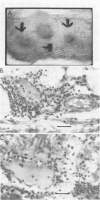Abstract
The octapeptide Asp-Gly-Gly-Ser-Glu-Ser-Glu-Gly and the hexadecapeptide Asp-Gly-Gly-Ser-Glu-Ser-Glu-Gly-Lys-Asn-Gly-Ser-Gln-Met-Arg-Leu, part of a tuberculin-active intracellular mycobacterial protein, were synthesized. The synthetic peptides were shown to possess tuberculin activity by their ability to elicit a delayed-type allergic reaction in skin tests on Mycobacterium tuberculosis-sensitized guinea pigs. Purified protein derivative, the complex mixture of proteins of unknown composition which are excreted into the culture medium by M. tuberculosis and which is in wide use as a tuberculin-active preparation, was shown to cross-react weakly in the radioimmunoassays with the synthetic octapeptide when the 125I-labeled octapeptide and an anti-octapeptide antiserum were used.
Full text
PDF






Images in this article
Selected References
These references are in PubMed. This may not be the complete list of references from this article.
- Bolton A. E., Hunter W. M. The labelling of proteins to high specific radioactivities by conjugation to a 125I-containing acylating agent. Biochem J. 1973 Jul;133(3):529–539. doi: 10.1042/bj1330529. [DOI] [PMC free article] [PubMed] [Google Scholar]
- Ellouz F., Adam A., Ciorbaru R., Lederer E. Minimal structural requirements for adjuvant activity of bacterial peptidoglycan derivatives. Biochem Biophys Res Commun. 1974 Aug 19;59(4):1317–1325. doi: 10.1016/0006-291x(74)90458-6. [DOI] [PubMed] [Google Scholar]
- Goodacre J., Jeffries L., Nayler J. H., Ponsford R. J., Stirling I. Antibacterial halogenoacetyl derivatives of amino acids and simple peptides. J Med Chem. 1977 Nov;20(11):1445–1448. doi: 10.1021/jm00221a015. [DOI] [PubMed] [Google Scholar]
- Hartter P. Synthese zweier Pentapeptide aus der Sequenz des Mastzellen-degranulierenden Peptids. Hoppe Seylers Z Physiol Chem. 1976 Dec;357(12):1683–1693. [PubMed] [Google Scholar]
- Kuwabara S. Amino acid sequence of tuberculin-active protein from Mycobacterium tuberculosis. J Biol Chem. 1975 Apr 10;250(7):2563–2568. [PubMed] [Google Scholar]
- Kuwabara S. Purification and properties of tuberculin-active protein from Mycobacterium tuberculosis. J Biol Chem. 1975 Apr 10;250(7):2556–2562. [PubMed] [Google Scholar]
- Offord R. E. Electrophoretic mobilities of peptides on paper and their use in the determination of amide groups. Nature. 1966 Aug 6;211(5049):591–593. doi: 10.1038/211591a0. [DOI] [PubMed] [Google Scholar]
- Pless J., Bauer W. Boron tris(trifluoroacetate) for removal of protecting groups in peptide chemistry. Angew Chem Int Ed Engl. 1973 Feb;12(2):147–148. doi: 10.1002/anie.197301471. [DOI] [PubMed] [Google Scholar]
- Savrda J. Synthesis and biological assays of a peptide from a tuberculin-active protein. Infect Immun. 1980 Dec;30(3):686–693. doi: 10.1128/iai.30.3.686-693.1980. [DOI] [PMC free article] [PubMed] [Google Scholar]
- Wünsch E., Drees F. Zur Synthese des Glucagons. X. Darstellung der Sequenz 22-29. Chem Ber. 1966 Jan;99(1):110–120. doi: 10.1002/cber.19660990119. [DOI] [PubMed] [Google Scholar]




